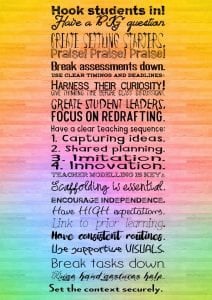The school I’m currently working in recently went through key stage change and it was a bigger culture change than I think anyone anticipated. It’s a bit like having been trained to handle twenty sloths and then being given thirty two puppies…
Time and energy were ploughed into creating new buildings and safe spaces for our new year sevens. Every department needed a new KS3 curriculum (one the linked into and built up to the GCSE and A Level content and skills. Everything from uniform to food to integration with our huge (and dynamic) sixth form was considered.
What we failed to consider adequately is that, actually, teaching KS3 is very different to teaching key stages four and five. Very different.
Having taught in 11-19 schools for the rest of my teaching life, I think I was employed in order to teach KS3, if I’m honest, along with another couple of teachers. What became evident very rapidly once the year sevens arrived was that experience really matters. Some staff, who’d only ever worked with key stages four and five, slipped naturally into teaching KS3 due to their natural skill and flexibility, others (despite being skilled and dedicated teachers) struggled or even floundered.
Nothing had prepared them for just how very different it is…
Being fair, what can prepare you?
What can prepare you for the constant questions:
“Shall I turn the page?”
“Shall I underline the date?”
“Can I go to the loo… again?”
What can prepare you for their need to get up and walk about, to come and speak to you at the front of the room at any given time even if you’re actually speaking to the entire class?
What can prepare you for their shorter attention spans and greater emotional needs?
That’s not to say they aren’t great. They are! Some of my favourite classes this year and last year have been my year seven classes…
They just need a bit of training, clear expectations, strong routines and a bit of warmth.
I don’t know about you but I love their energy, enthusiasm, curiosity and (fairly consistent) desire to please. They’re adorable and in your face all at once.
What we needed as staff wasn’t just a strong curriculum in place but advice and forewarning about how to teach much younger students. This is what I wish we’d known:
- Energy is essential. Pace and enthusiasm have a massive impact on younger students and are essential in keeping them on task and maintaining momentum. Breaking tasks up (rather than simplifying them) really helps.
- Consistent classroom routines and practices save time, effort and nagging. This is also true of lesson and teaching sequences. Having a clear order of tasks (and telling students what they are) makes life much easier.
- Praising good behaviours constantly is much more effective than telling students off.
“Well done, Lily, for having your book our and writing down the date!”
“Well done Tope for being the first to sit down and get your coat off.”
“Brilliant, Jagvinder! You can answer the question because you’re sitting quietly and patiently with your hand up. I’m impressed.”
Obviously, not everyone loves teaching all key stages, obviously, but forewarned is forearmed and, I think, teaching every key stage really helps to develop and hone our teaching skills. Plus, variety really is the spice of life!
